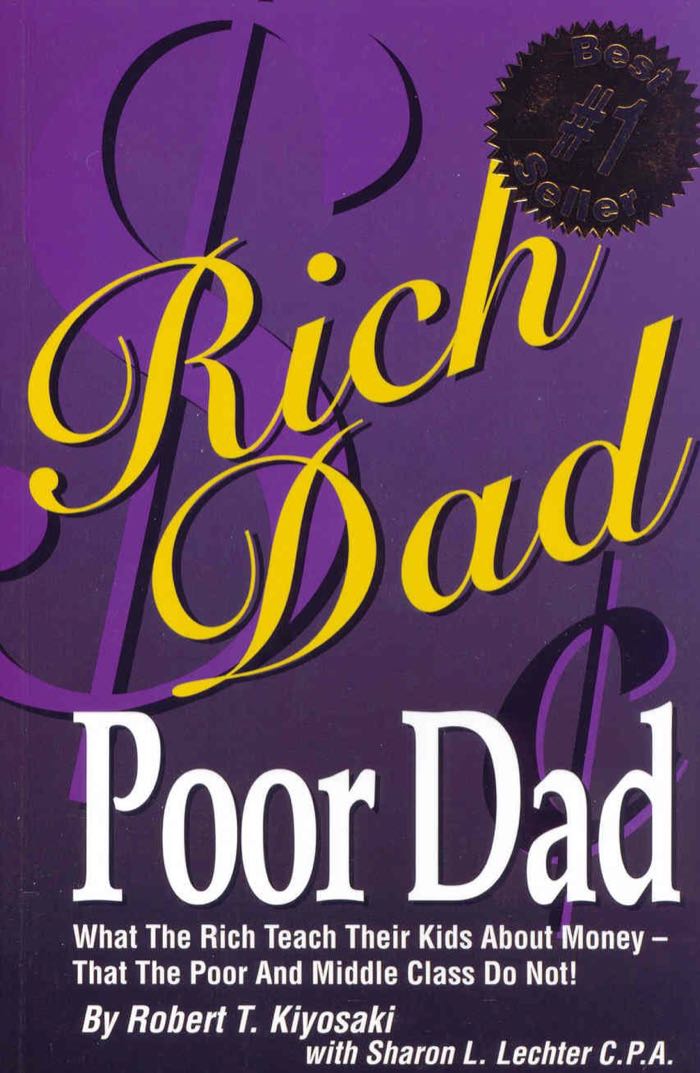Rich Dad, Poor Dad
Reviewed date: 2006 Sep 20
197 pages
Robert Kiyosaki's bestselling book Rich Dad, Poor Dad teaches money-making concepts by comparing the advice Kiyosaki got from the two fathers in his life. Poor dad is his real father, a college professor who worked hard, earned lots of money, and died a debtor. Kiyosaki's rich dad is the father of his best friend Mike. Rich dad has little formal education, but understood money; he became one of the richest men in Hawaii. (Rich dad doesn't exist; he's a composite character used mostly as an authorial device, but that doesn't affect the quality of his advice.)
A book about money should do three things:
- Teach you how to think about money
- Give sound advice
- Accurately portray the risks as well as the rewards of various money-making opportunities
Rich Dad, Poor Dad does an excellent job with the first, but falls flat on the other two fronts. That does not make it a bad book. It is a good book, but only if one realizes its limitations. It should be used only to change the way you think about money. Ignore all of Kiyosaki's practical advice, which is more likely to land you in the poorhouse or in prison than to make you rich.
If you think your house is an asset, you need to read this book
The conventional wisdom is that your house is an asset. Kiyosaki explains that for most people, this kind of asset is actually a liability. The best way to think about money, says Kiyosaki, is by analyzing cash flow. If something puts money in your pocket, it's an asset. If something costs you money, it's a liability. So, does your house put money in your pocket? Between mortgage payments, property taxes, and maintenance, a house costs you money each month. You may have a million-dollar home, but if it costs you money each month it's a liability.
Don't be ruled by fear and desire
Most people buy emotionally. Every purchase starts with an emotional desire to have something. Rather than be a slave to your desires, Kiyosaki says that you should observe and analyze your emotions. If you understand why you want things, why you do things, and why you feel various desires, you can take charge of your life. It takes training to learn to distinguish between a valid need and a vain, emotional want.
Some bad advice
So far so good. But Kiyosaki has some strange advice. For example, he says mutual funds are one of the worst, most dangerous investments you can buy. That flies in the face of conventional wisdom, so the onus is on Kiyosaki to explain his reasoning. He makes only tangential references to why he believes mutual funds are risky, but it boils down to this: when the stock market crashes (which Kiyosaki believes it will) there's no insurance to protect you against loss. Kiyosaki himself invests in real estate, so if the stock market crashes at least he'll own something tangible.
Recessions, depressions, and stock market crashes happen. Unless the entire economy of the Western world collapses, a well-diversified mutual fund investment will survive the crash. And if the entire economy collapses--bringing governments down with it--you wouldn't be any better off if you'd invested in real estate. In the absence of a functioning government, who's going to enforce your legal ownership of that property?
Kiyosaki does bring up one good point when he criticizes the US dollar for being a fiat currency with no intrinsic value. That's beyond the comprehension of most people, though, and Kiyosaki mentions it only briefly. It's a valid concern, but again, barring a total collapse of American society and government, you don't have anything to worry about.
Illegal advice
Ignore the practical advice Kiyosaki gives. When he tells you to form a corporation so you can take tax deductions, it's not actually a good idea. His statement that ""vacations are board meetings in Hawaii" is an invitation to break the law. If you try to make such a deduction, the IRS will come after you. You should understand the principle--if you register as a business, you may be entitled to deduct legitimate business expenses--but it's not as big a loophole as Kiyosaki claims.
Risk vs. Reward
Finally, a good investment book should explain the risks as well as the rewards of any investment strategy. Kiyosaki talks glowingly about his real estate deals, but fails to mention the risks involved. He talks about spending a few hours of work to flip a house and make thousands of dollars, as if those kinds of deals are available every day to anybody who spends a few minutes looking. Kiyosaki may have made some money in real estate (although he made most of his fortune selling Rich Dad, Poor Dad merchandise) but that doesn't mean there is no risk involved.
Also, Kiyosaki encourages people not to diversify their investments. According to him, rich people put all their eggs in one basket. Yeah, great job Kiyosaki. Better advice is: learn to manage risk appropriately. It is possible to be too afraid of losing money. But my goodness, it's OK to diversify a little bit.
Conclusion
I keep changing my mind about Rich Dad, Poor Dad. At first I loved it, then I grew suspicious. After some research I was prepared to dismiss the book as junk and Kiyosaki as a demagogue. But upon deeper reflection, I believe there is real value in Rich Dad, Poor Dad. If you don't know much about money, you should read it. Don't act on any of the advice he gives; instead, just use it to help you think about money. Think for a few weeks or months. Read other books, gather more knowledge.
